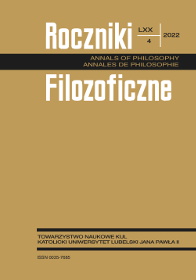SPINOZA’S GEOMETRY OF AFFECTIVE RELATIONS, THE BODY POLITIC, AND THE SOCIAL GRAMMAR OF INTOLERANCE: A MINIMALIST THEORY OF TOLERATION
SPINOZA’S GEOMETRY OF AFFECTIVE RELATIONS, THE BODY POLITIC, AND THE SOCIAL GRAMMAR OF INTOLERANCE: A MINIMALIST THEORY OF TOLERATION
Author(s): ELAINY COSTA DA SILVA, NYTHAMAR DE OLIVEIRASubject(s): Political Philosophy, Social Philosophy, Philosophy of Religion, Politics and society
Published by: Towarzystwo Naukowe KUL & Katolicki Uniwersytet Lubelski Jana Pawła II
Keywords: affections; intersubjectivity; political body; Spinoza; tolerance;
Summary/Abstract: In this paper, we set out to show that the relationships between individuals, including the intersubjectivity inherent to the body politic, are also affective relationships, so as to reconstruct Spinoza’s minimalist theory of tolerance. According to Spinoza’s concept of affectivity and bodily life, affection refers to a state of the affected body and implies the presence of the affecting body, while affect refers to the transition from one state to another, taking into account the correlative variation of affective bodies, that is, the affect is always a passage or variation in the intensity of our power to exist and act—the increase or decrease, the favoring or the restraint of our power to exist and act. We argue that Spinoza’s geometry of affective relations decisively contributes to a political theory of democracy, insofar as it anticipates modern, liberal conceptions of tolerance.
Journal: Roczniki Filozoficzne
- Issue Year: 70/2022
- Issue No: 4
- Page Range: 237-269
- Page Count: 33
- Language: English

